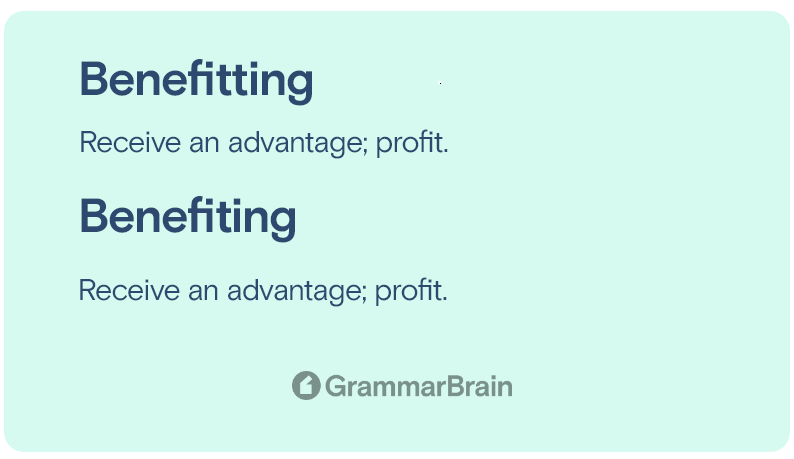Is it benefiting or benefitting? In the English language, there is a major difference between the words “benefitting” and “benefiting”. They have several meanings, and using the incorrect word can obviously change the complete meaning of a sentence.
In this blog post, we will explain the difference between these two words, so you can be sure to use the correct one in your writing.

What is the difference between benefiting and benefitting?
The answer may surprise you! These two words actually have different meanings, even though they may look and sound alike. To benefit means to receive an advantage or profit, while to benefitting means to be helpful or useful. Let’s take a closer look at each word to see how they differ.
When you benefit from something, you gain an advantage or profit from it. For example, if you receive a raise at work, you are benefiting from your employer’s generosity. If you invest in a company and its stock goes up, you have benefited financially.
| Word | Spelling |
| Benefiting | American English |
| Benefitting | British English (UK) |
Benefitting, on the other hand, means to be helpful or useful. If you do something that benefits someone else, you are making their life better in some way.
For example, if you volunteer at a soup kitchen, you are benefitting the people who receive the free meals. If you tutor a struggling student, you are benefitting them by helping them improve their grades.
| Word | Definition |
| Benefiting (benefit) | gerund or present participle: benefiting |
| Benefitting | Incorrect spelling: receive an advantage; profit. |
How can you use benefiting and benefitting in your writing?
One way to make your writing more effective is to use words that have a positive connotation, or that suggest something beneficial. For example, instead of saying “I’m going to lose weight,” you could say “I’m going to get healthier.”
Benefiting and benefitting can be used in all sorts of writing, from essays to blog posts to social media updates. Simply swapping out a few keywords can make your writing more upbeat and positive.
Here are a few other examples of how you can use benefiting and benefitting in your writing:
- Instead of saying “I’m going to work hard,” you could say “I’m going to be productive.”
- Instead of saying “I’m going to try my best,” you could say “I’m going to do my best.”
- Instead of saying “I’m going to get through this,” you could say “I’m going to overcome this.”
Using benefiting and benefitting is a simple way to make your writing more positive and effective.
Are there any other words that are similar to benefiting and benefitting?
Yes, there are a few other words that have similar meanings to benefiting and benefitting. These words include helping, aiding, and contributing. Helping refers to providing assistance or support to someone in need, while aiding means giving assistance or support to someone to further their cause.
Contributing refers to providing something of value or importance, typically in the form of time or money. Each of these words has a slightly different connotation, so it is important to choose the one that best fits the context in which it will be used.
Conclusion
The verb to benefit is often confused with the verb to benefitted, but there is a big difference between the two. Benefitting is when something improves as a result of an action or event. While benefitting is when someone receives money or another type of assistance.
In English, we use the word benefit to describe both meanings, but it’s important to be aware of the distinction so that you can use the correct verb in your writing. Have you ever made this mistake?
Inside this article
Fact checked:
Content is rigorously reviewed by a team of qualified and experienced fact checkers. Fact checkers review articles for factual accuracy, relevance, and timeliness. Learn more.
Core lessons
Glossary
- Abstract Noun
- Accusative Case
- Anecdote
- Antonym
- Active Sentence
- Adverb
- Adjective
- Allegory
- Alliteration
- Adjective Clause
- Adjective Phrase
- Ampersand
- Anastrophe
- Adverbial Clause
- Appositive Phrase
- Clause
- Compound Adjective
- Complex Sentence
- Compound Words
- Compound Predicate
- Common Noun
- Comparative Adjective
- Comparative and Superlative
- Compound Noun
- Compound Subject
- Compound Sentence
- Copular Verb
- Collective Noun
- Colloquialism
- Conciseness
- Consonance
- Conditional
- Concrete Noun
- Conjunction
- Conjugation
- Conditional Sentence
- Comma Splice
- Correlative Conjunction
- Coordinating Conjunction
- Coordinate Adjective
- Cumulative Adjective
- Dative Case
- Determiner
- Declarative Sentence
- Declarative Statement
- Direct Object Pronoun
- Direct Object
- Diction
- Diphthong
- Dangling Modifier
- Demonstrative Pronoun
- Demonstrative Adjective
- Direct Characterization
- Definite Article
- Doublespeak
- False Dilemma Fallacy
- Future Perfect Progressive
- Future Simple
- Future Perfect Continuous
- Future Perfect
- First Conditional
- Irregular Adjective
- Irregular Verb
- Imperative Sentence
- Indefinite Article
- Intransitive Verb
- Introductory Phrase
- Indefinite Pronoun
- Indirect Characterization
- Interrogative Sentence
- Intensive Pronoun
- Inanimate Object
- Indefinite Tense
- Infinitive Phrase
- Interjection
- Intensifier
- Infinitive
- Indicative Mood
- Participle
- Parallelism
- Prepositional Phrase
- Past Simple Tense
- Past Continuous Tense
- Past Perfect Tense
- Past Progressive Tense
- Present Simple Tense
- Present Perfect Tense
- Personal Pronoun
- Personification
- Persuasive Writing
- Parallel Structure
- Phrasal Verb
- Predicate Adjective
- Predicate Nominative
- Phonetic Language
- Plural Noun
- Punctuation
- Punctuation Marks
- Preposition
- Preposition of Place
- Parts of Speech
- Possessive Adjective
- Possessive Determiner
- Possessive Case
- Possessive Noun
- Proper Adjective
- Proper Noun
- Present Participle
- Prefix
- Predicate



